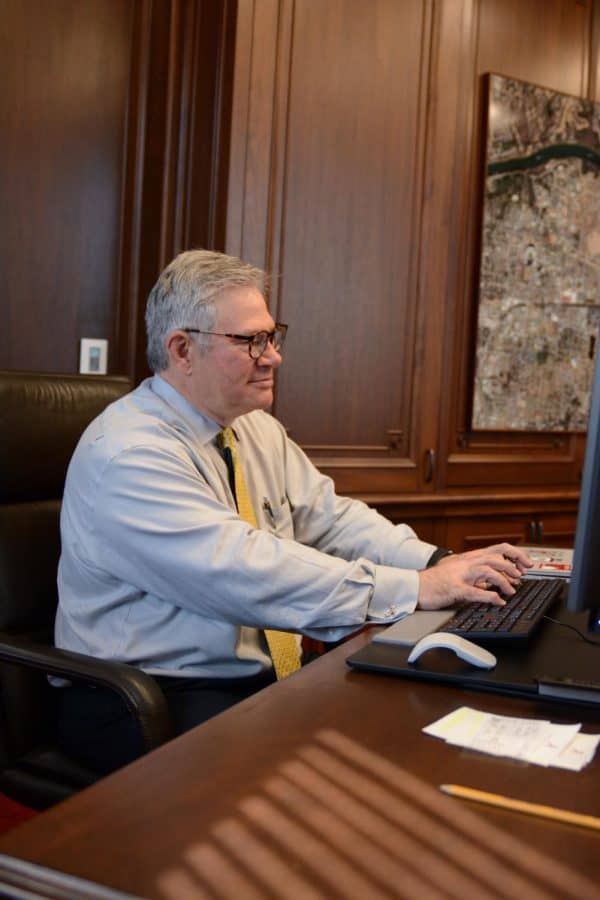Employee concerns about Fajack unchanged
April 22, 2019
The Crimson White addressed concerns circulating among employees of the Supe Store and the Ferguson Mail Center stemming from the supposed plans of Matt Fajack, the vice president for the Division of Finance and Operations in a story published on April 4.
Employee worries ranged from a loss of spring break in the upcoming academic year to a potential outsourcing of campus organizations. Fajack responded to these concerns, providing his personal explanation for the source of these speculations and acknowledging his professional history that had been discussed among employees.
Following the publication of Fajack’s remarks, The Crimson White received multiple letters written by anonymous campus employees requesting a follow-up interview. The author of each letter mentioned inconsistencies between the information they’ve received in staff meetings and the details Fajack supplied in his previous interview.
“It doesn’t seem he is ever going to be honest about any of these things,” wrote one anonymous employee.
Fajack pointed to a misinterpretation of tentative dates published on the academic calendar coupled with an investigation of his projects at previous universities as the root of the rumor that spring break will be taken away.
The authors of these letters were not satisfied with this response. One anonymous employee wrote that “Matt was not able to get his plan to eliminate Spring Break for UA employees approved. Therefore, Matt now claims that eliminating Spring Break was just a bad rumor.”
Despite the insistence among employees that these speculations arose from information provided during staff meetings, Fajack stands by his previous statements.
The anonymous letters expressed disappointment in Fajack’s failure to mention additional outsourcing plans in an interview about outsourcing, but they also conveyed frustration with his decision to not share what they viewed as the complete narrative of his previous work at The University of North Carolina at Chapel Hill.
In the previous interview Fajack stated that all UNC employees of the campus bookstore retained their jobs when it became a Barnes & Noble with the same pay and benefits. He did not mention the three-year limit of this requirement. One anonymous letter spoke of UNC employees being terminated or receiving substantial pay cuts at the end of these three years, questioning the security UA employees will have if a similar deal is made.
Fajack faced limitations in the process of outsourcing and was unable to grant them more than three years of security, but he believed this was enough time for employees to build rapport with the new management.
“It was a three-year deal, but I don’t know why they would invest three years of time and money into those people and then fire them,” Fajack said. “They’ve actually hired two or three of the student employees to work at their corporate offices. They’ve taken two of the permanent employees and made them store managers at other universities.”
One anonymous employee’s letter suggested that while Fajack’s statements about the current status of plans to outsource the Supe Store and Ferguson Mail Center might be true, he has also assembled a task force to outsource the maintenance and operation of the campus medium-voltage electrical system and energy plants to a private contract company.
This employee, whose views also seem to be felt among the authors of the other letters, viewed Fajack’s failure to mention this potential outsourcing during an interview about the topic as deceitful.
Fajack said that his previous lack of comment to The Crimson White on these plans was because he was not asked about them. Additionally, he does not view the situation as outsourcing because retaining current electrical and energy crews would be a priority in adopting this new model.
The University currently distributes energy from Alabama Power to all buildings on campus. Fajack assembled a task force to evaluate new methods of distribution to optimize this process.
Ohio State University was paid $1 billion up front in a transaction with several private companies. It granted these companies concessions for 70 years to take over the energy distribution systems. The Ohio State model is one this task force has considered, but this undertaking is still in its earliest stages.
“We’re a long way from doing anything,” Fajack said. “We’re starting a task force. It may not make any sense at all. We may be doing the perfect thing right now, but I can’t ignore Ohio State getting a billion dollars.”
Fajack’s interest in exploring alternative energy systems has left employees wondering if the University is in poor financial standing. The University is financially strong, Fajack said, but his focus is always on being more efficient, maximizing revenue and keeping costs down for students.
One employee mentioned Fajack’s requirement that all departments make a 3% spending cut for the next fiscal year, but he dismissed this as a precautionary part of the budget review process.
Another employee’s letter voiced concerns that Fajack’s goal is to “get a quick influx of cash and then take another job and leave the rest of us here on a sinking ship.”
Fajack acknowledged that he has “hopped around” a bit since entering the world of finances at universities. He never planned to work at The University of Alabama, but after being invited to interview by President Stuart R. Bell, he loved the energy of the campus and its focus on undergraduate education and even sees himself retiring at the University.
From an employee’s perspective, it would be easy to find another high-paying job working elsewhere without wondering if their job is at risk. A year from now when Fajack’s plans could potentially be playing out, the job market might not be as safe.
“They’re not going anywhere.” Fajack said. “They’re welcome to. I can’t stop them from leaving, but my commitment to them is to keep them as employees.”
The anonymous letters sent in to The Crimson White by employees suggest some level of inability they feel in voicing their concerns to him directly. Fajack has considered publishing an employee newspaper to address rumors.
“But [the employees] are always welcome to send me anonymous stuff,” Fajack said. “I don’t like anonymous because I can’t go and talk to them about it. I’m serious when I say [employees can] ask me any question and I’ll be glad to answer it. If people have good ideas or think I’m doing something wrong, I don’t hold it against them.”










